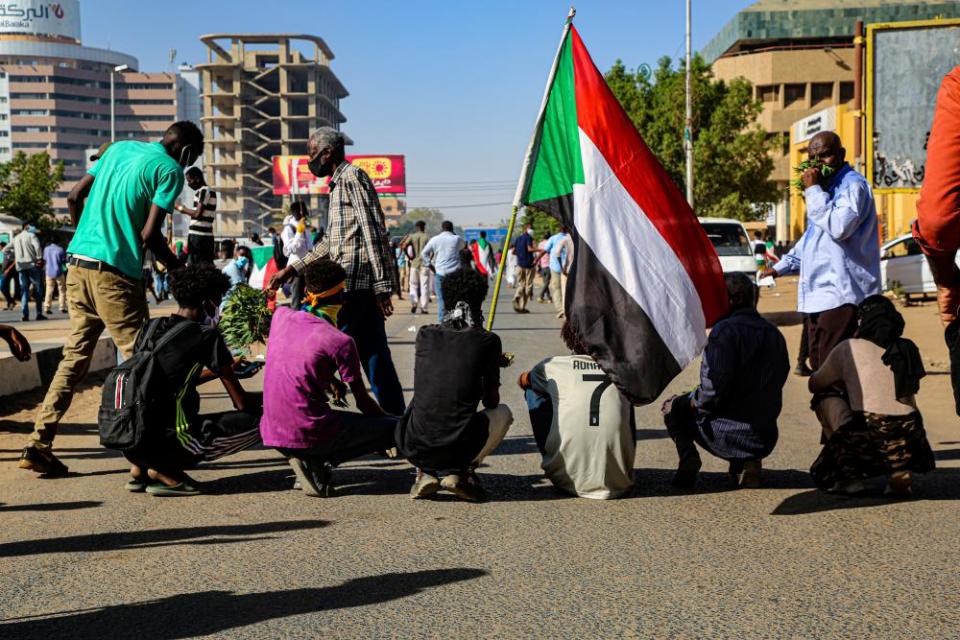I feel despair at Sudan’s coup. But my children’s mini protest gives me hope

After 30 years in exile, it’s easy to doubt that it will ever be safe to live and work in Sudan. But the action being taken by young people shows democracy will rise again
“All the goodness and the heroisms will rise up again, then be cut down again and rise up,” John Steinbeck wrote to a friend in 1941, just before the US entered the second world war. “It isn’t that the evil thing wins – it never will – but that it doesn’t die.”
Growing up, I was always interested in politics, politics was the reason I had to leave Sudan at the age of 11. At school, we weren’t allowed to study or discuss it, and it was the same at home.For years, I lay in bed and listened to my father and his friends as they argued about politics and sang traditional songs during their weekend whisky rituals. They watched a new Arabic news channel, Al Jazeera, which aired from Qatar. All the journalism my father consumed about Sudan was from the London-based weekly opposition newspaper, Al Khartoum. The only time he turned on our dial-up internet was to visit Sudanese Online.
At the time, I never understood how Sudanese activists and political figures, like my diplomat father, who cared deeply about the country and had fought for their principles for so long, suddenly submissively stepped back. Or worse, why they sheltered their children from the issues. I always wondered, “So who are you fighting for then?”
With guidance and access to citizen journalism, these younger generations are far more action-oriented. What we achieved in a decade will take them less time
In my adult life, opposing former president Omar al-Bashir’s authoritarianism and corruption became a personal battle for me, more so with every year I spent outside Sudan. It took shape slowly, until a few years before the Arab spring it peaked with the publication of my political cartoons on social media. I blogged, tweeted and posted, knowing that, although working in exile gave me a level of freedom unavailable to dissidents at home, I also risked everything through being unflinching in my criticism.
This last decade since the Arab spring has been a political rollercoaster. It was an honour to see my work shared by protesters all over the world – and be recognised by the BBC and the New York Times. I’ve published two books and had exhibitions around the world, been detained in two different countries, and wanted in my own. Like many fellow activists, I’ve experienced the effects of despair and burnout.
Deep into the long winter that has followed the quashed Arab spring, and just as I was ready to give in to my despair, a second wave ofrebellion has hit Sudan. Bashir’s bloody 30-year rule ended, finally, in a revolution led by women, artists and unions. This uprising on the streets of Sudan was matched with huge support from members of the diaspora, exiled by Bashir’s regime. Returning in the wake of the uprising was an extraordinary experience. For the first time in a decade, I entered Sudan without expecting arrest. I tried to explain to my children how the people had won and collectively overcome this evil man who ruled Sudan; that although he dressed like a policeman, he was a criminal.
In the past rocky two years , Sudan has seen an influx of families who left three decades ago – people trying to regain what was lost. But it seems the counter-revolutionaries remain strong – determined to prevent democracy. Even with international support limited to Egypt, Saudi and the UAE, the October coup against the transitional government has been a huge defeat for those working towards a free Sudan.
At 41, I hoped my children could experience Sudan as home. But it’s hard to keep hoping it will be safe in Sudan to continue my activism and work as a political cartoonist anytime soon.
Related: Can artistic freedom survive in Sudan? The writing’s on the wall…
Now, I understand how my father and his friends felt. In a country that has had six coups since independence in 1956, I can understand the instinct to protect children from instability, uncertainty and tragedy. I spend most nights on WhatsApp sending frustrated voice messages about the situation. All my friends and I talk about is news about Sudan. I find myself trying to shield my children from the (mostly bad) news.
How do I explain that our army is killing young men and women? How do I explain that bad men in police uniforms are back again? That evil has returned so fast?
In the end I did not need to. My eldest daughter used her screen time to read posts and watch videos about Sudan. Early one Friday morning I awoke to a mini anti-coup protest with her and her younger siblings waving flags and shouting slogans in our living room.
With guidance and citizen journalism, these younger generations are far more action-oriented than we used to be. What we achieved in a decade will take them less time. As authoritarianism evolves, humans discover new ways to gain their freedoms. If my young children can stage a protest in their living room, despite my best efforts to shelter them from the news, imagine what’s going on inside Sudan right now.
Khalid Albaih is a Sudanese artist and cartoonist living in Qatar. His work can be found on Instagram @khalidalbaih

 Yahoo Finance
Yahoo Finance 